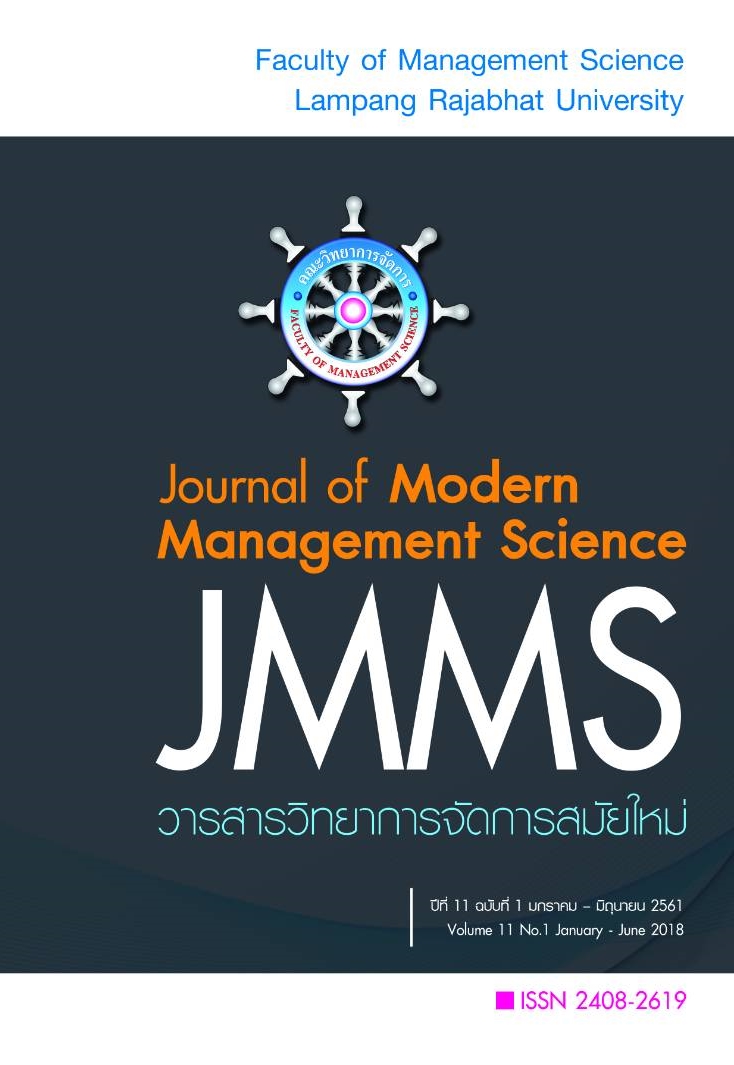Antecedents of Strategic Accounting Practice Process Orientation: Empirical Evidence from Small and Medium Enterprises (SMEs) Auto Parts Businesses in Thailand
Main Article Content
Abstract
Small and Medium Enterprises (SMEs) of an auto parts businesses are considered important for generating national revenue in Thailand. However, the industry is currently facing export competition with foreign countries specifically those ASEAN countries. Strategic accounting practice process orientation functions as an important key for businesses to successfully adjust themselves under globalization. The following variables affected the use of strategic accounting practice process capabilities of businesses. The purpose of this research was to examine the effects of antecedents on strategic accounting practice process orientation of SMEs auto parts businesses in Thailand. Data were collected by mailed survey from 106 auto parts businesses in Thailand. The statistics used for analyzing data included correlation and multiple regression. The findings indicated that accounting system effectiveness, accounting ethical orientation and stakeholder expectation had a positive effect on strategic accounting practice process orientation. Furthermore, conclusions and recommendations for future research were provided in the last section of this research.
Article Details
The article must be considered and accepted for publication by the editorial board of the Faculty of Management Science, Lampang Rajabhat University. The articles have been reviewed by a peer (peer review) and the author must update according to the suggestion if available before publication. Articles that are not considered the editorial team will inform the results of the consideration but will not send the original to the author.
JMMS is the Faculty of Management Science journal, Lampang Rajabhat University. Jmms published both print and online editions. We allow the use of articles for academic use under the scope of copyright law.
References
Akadakpo, B. A. & Enofe, A. O. (2013). Impact of Accounting Ethics on the Practice of Accounting \ Profession in Nigeria. Journal of Business and Management, 12(1), 45-51.
Amidu, M., Effah, J. & Abor, J. (2011). E-accounting Practices Among Small and Medium
Enterprises in Ghana. Journal of Management Policy and Practice, 12(4), 146.
Armstrong, J. S. & Overton, T. S. (1977). Estimating Nonresponse Bias in Mail Surveys. Journal of
Marketing Research, 14(3), 396-402.
Baker, C. R. & Barbu, E. M. (2007). Evolution of Research on International Accounting Harmonization:
A Historical and Institutional Perspective. Socio-Economic Review, 5(4), 603-632.
Bradford, M. & Florin, J. (2003). Examining the Role of Innovation Diffusion Factors on the
Implementation Success of Enterprise Resource Planning Systems. International Journal of Accounting Information Systems, 4(3), 205-225.
Chenhall, R. H. (2003). Management Control Systems Design within Its Organizational Context:
Findings from Contingency-based Research and Directions for the Future. Accounting, Organizations and Society, 28(2), 127-168.
Feng, M., Li, C. & McVay, S. (2009). Internal Control and Management Guidance. Journal of
Accounting and Economics, 48(2), 190-209.
Hair, J. F., Anderson, R. E., Babin, B. J. & Black, W. C. (2010). Multivariate Data Analysis: A Global
Perspective (Vol. 7). New Jersey: Pearson.
Hartmann, A. & Hietbrink, M. (2013). An Exploratory Study on the Relationship Between
Stakeholder Expectations, Experiences and Satisfaction in Road Maintenance. Construction Management and Economics, 31(4), 345-358.
Held, D. (2013). Political Theory and the Modern State. New York: John Wiley & Sons.
Kaplan, R. S. & Norton, D. P. (2007). Using the Balanced Scorecard as a Strategic Management
System. Harvard Business Review, 85(7-8), 150-161.
Kara, E. & Kilic, Y. (2011). Accounting Recording System on Accrual Basis at Local Authorities in
Turkey: An Application in Gaziantep Local Municipality. International Journal of Business and Social Science, 2(15), 244-250.
Kizil, C., Çetin, A. T., & Bulunmaz, A. (2014). Accounting Education Approach in the Context of
New Turkish Commercial Code and Turkish Accounting Standards. Emerging Markets Journal, 4(1), 72.
Klimek, J. & Wenell, K. (2011). Ethics in Accounting: an Indispensable Course?. Academy of
Educational Leadership Journal, 15(4), 107.
Kohlbeck, M. & Warfield, T. (2010). Accounting Standard Attributes and Accounting Quality:
Discussion and Analysis. Research in Accounting Regulation, 22(2), 59-70.
Mattingly, J. E., Harrast, S. A. & Olsen, L. (2009). Governance Implications of the Effects of Stakeholder Management on Financial Reporting. Corporate Governance: The
International Journal of Business in Society, 9(3), 271-282.
Moorthy, K. M., Voon, O. O., Samsuri B. S., Gopalan, M. & Yew K. T. (2012). Application of Information Technology in Management Accounting Decision-making. International
Journal of Academic Research in Business and Social Sciences, 2(3), 1-16.
Nicolaou, A. I. & McKnight, D. H. (2006). Perceived Information Quality in Data Exchanges: Effects on
Risk, Trust, and Intention to Use. Information Systems Research, 17(4), 332-351.
Nunnally, J. C. & Bernstein, I. H. (1994). The Assessment of Reliability. Psychometric Theory, 3(1),
248-292.
Rezaee, Z., Smith, L. M. & Szendi, J. Z. (2010). Convergence in Accounting Standards: Insights from
Academicians and Practitioners. Advance in Accounting, 26(1), 142-154.
Rose, J. & Kraemmergaad, P. (2006). ERP Systems and Technological Discourse Shift: Managing the
Implementation Journey. International Journal of Accounting Information Systems,7(3), 217-237.
Santos, G., Montoni, M., Vasconcellos, J., Figueiredo, S., Cabral, R., Cerdeiral, C. & Rocha, A. R.
(2007). Implementing Software Process Improvement Initiatives in Small and Medium-size
Enterprises in Brazil. In 6th International Conference on the Quality of Information and
Communications Technology, 2007. (pp. 187-198). Canada: IEEE.
SMEs Knowledge Center, Office of Small and Medium Enterprise Promotion (OSMEP). n.d.
(Online). Available from: http://www.sme.go.th/th/index.php/know-ledge center/…1/618-smes knowledge-center2 [accessed 30 September, 2016].
Wangraj, P., Ussahawanitchakit, P. & Muenthaisong, K. (2014). Audit Responsibility Competency
and Audit Survival: Evidence from TAX Auditors (TAs) in Thailand. AU-GSB Journal, 7(2).
Yamane, T. (1973). Statistics: An Introductory Analysis. 2nd ed. New York: Haper and Row Press.
Zhang, Y., Zhou, J. & Zhou, N. (2007). Audit Committee Quality, Auditor Independence, and
Internal Control Weaknesses. Journal of Accounting and Public Policy, 26(3), 300-327.

